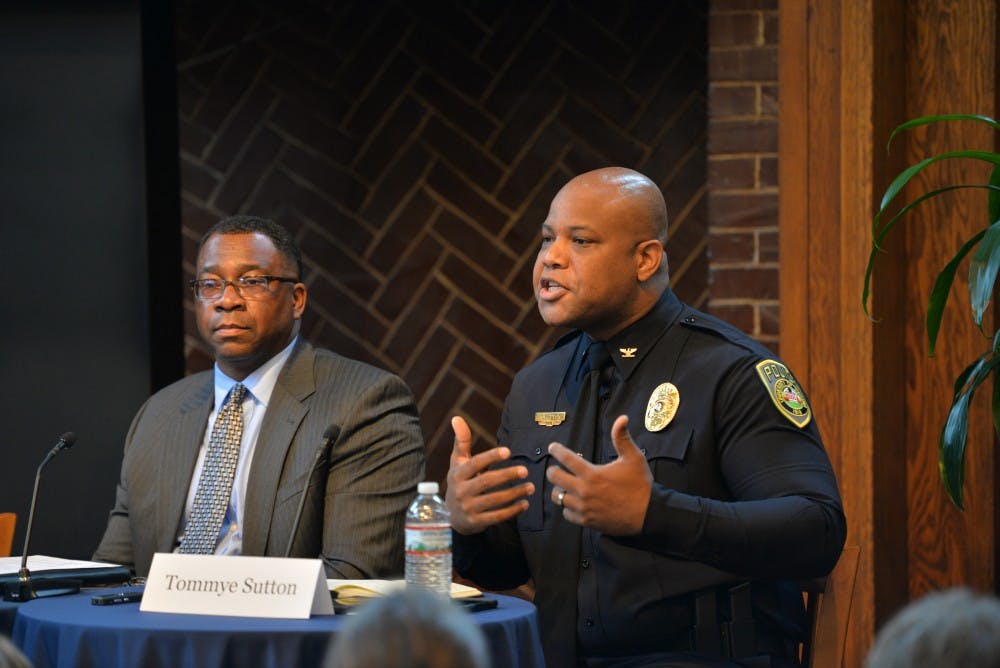The Batten School of Leadership and Public Policy hosted a panel of law enforcement and legal experts to discuss community policing for its annual commemoration of Constitution Day Monday morning. The panel focused on fostering trust and cooperation between police forces and the communities they serve.
Approximately 80 students, professors and Charlottesville residents attended the event in Garrett Hall.
Timothy Longo, who served as the City of Charlottesville’s chief of police from 2001-2016, moderated the discussion. The panelists included Law Prof. Rachel Harmon, Assoc. Public Policy Prof. Brian Williams and University Chief of Police Tommye Sutton.
“How we think about how our Constitution empowers — as well as constrains — law enforcement and citizens alike is of great importance today as it was in 1787,” Batten Dean Allan C. Stam said during his opening remarks. “Relationships between police forces — whether federal, state or local — and the communities they operate in are fraught with risk, hazard, fear … But also opportunity and possibility of cooperation and forward movement.”
Williams told The Cavalier Daily that community policing is a “partnership that exists between community residents and local law enforcement.”
“[Community policing] is aspiring toward this position of ‘power with’ and away from ‘power over,’" Williams said in an interview. “That, of course, creates challenges both within police departments and communities to prepare for that transition.”
Sutton, who started as police chief Aug. 1, discussed how factors like race affect relations between police and communities.
“In relation to the Constitution, my job from my perspective is to operate the police department within the confines of the Constitution that was written for all of us but hasn’t been historically extended to all of us,” Sutton said.
Panelists discussed ways police forces can work to restore trust from the communities they represent, especially after events such as the Unite the Right rally of August 2017 and the bloody arrest of former University student Martese Johnson in 2015.
Following Johnson’s arrest on the Corner, students spoke out against police brutality through marches, social media campaigns and die-ins. Last year, community members and students criticized police for failing to prevent violence when white supremacists marched on the Lawn Aug. 11 and Downtown Aug. 12, causing increased tensions between police, students and Charlottesville residents.
“One of the takeaways that we took from what happened last summer is that the department’s actions had really significant and deep effects on community trust — and that’s very, very hard to rebuild,” Harmon in an interview. “There were many parts of the community that had concerns about policing before and those have been exacerbated. It’s going to be a long-term process to rebuild that trust, and it’s going to take a lot of work on all sides.”
Members of the audience asked the panelists questions concerning accountability and transparency with the Charlottesville Police Department, as well as specific ways the University Police Department plans to engage with the community.
After Sutton said University police intend to use their presence on Grounds to foster more interaction with individual students, a Charlottesville community member asked about the responsibilities of the University community as a whole to build relationships with police.
“How do we think about community policing and strategies on this broader level in terms of engaging groups of people rather than just one-on-one?” the audience member asked.
Sutton said the University plans to host “town-hall type” events to discuss non-law enforcement related topics in an effort to foster dialogue with members of the student body.
Tensions between students and UPD came to a head recently at U.Va. Students United’s Aug. 11 anniversary demonstration, when many of the participants protested the large number of police officers posted at the event.
Previous topics discussed at the Batten School on Constitution Day include same-sex marriage, the Affordable Care Act, counter-terrorism, religion in schools and the First Amendment on college campuses.







